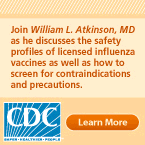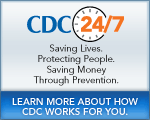Febrile Seizures Following Childhood Vaccinations, Including Influenza Vaccination
Questions & Answers
On This Page
- What is a febrile seizure?
- Is there an increased risk for febrile seizures after any childhood vaccine?
- Is there an increased risk for febrile seizures after children receive an influenza (flu) vaccine?
- Who is most at risk for febrile seizures?
- How serious is a febrile seizure?
- Can febrile seizures after childhood vaccinations be prevented?
- Can febrile seizures after any childhood vaccination be reported to CDC and FDA?
- Where can I learn more about febrile seizures?
What is a febrile seizure?
Febrile means "having a fever." A seizure is a convulsion or fit of uncontrolled body movements. A “febrile seizure” refers to a seizure/convulsion in a child associated with a fever. In children younger than 5 years old, having a fever for any reason (illness, vaccination, etc.) can bring on a febrile seizure. During a febrile seizure, a child often has spasms or jerking movements—large or small—and may lose consciousness. Febrile seizures usually last only a minute or two, and do not cause any permanent neurological damage. They are most common with body temperatures reaching 102°F (38.9°C) or higher, but also can occur at lower body temperatures or when a fever is going down.
Is there an increased risk for febrile seizures after any childhood vaccine?
Febrile seizures can happen with any condition that causes a fever, including typical childhood illnesses like a cold, influenza (flu), an ear infection, or roseola. They are most common after infections, including those that can be prevented by vaccination. Rarely, febrile seizures can occur after vaccination.
Is there an increased risk for febrile seizures after children receive an influenza (flu) vaccine?
Febrile seizures can occur when a child is sick with influenza virus infection or other childhood illnesses that may cause fever. Therefore, febrile seizures are commonly seen during cold and flu season in the United States. However, several studies of children in the United States have been conducted to see if there is an increased risk for febrile seizures following receipt of seasonal flu vaccines. One study evaluated more than 45,000 children aged 6 months through 23 months of age who received influenza vaccines from 1991 through 2003 and did not find an association with seizures. In addition, there was no indication that seasonal flu vaccines or the 2009 H1N1 flu vaccines used in the United States during the 2009-2010 flu season were associated with an increased risk of febrile seizures.
On a separate note, during the 2010–2011 influenza season, CDC and the Food and Drug Administration (FDA) conducted enhanced monitoring for febrile seizures after influenza vaccination because of reports of an increased risk for fever and febrile seizures in young children in Australia associated with a 2010 Southern Hemisphere vaccine produced by CSL Biotherapies (up to nine febrile seizures per 1,000 doses). Because of the findings in Australia, the U.S. ACIP does not recommend the U.S.-licensed CSL Biotherapies' trivalent inactivated vaccine (Afluria) for children younger than 9 years.
In another study, CDC studied the health care visit records of more than 200,000 vaccinated children 6 months through 4 years of age through its Vaccine Safety Datalink project during the entire 2010-2011 influenza season. The analyses found that febrile seizures following inactivated influenza vaccine and pneumococcal conjugate (PCV13) vaccines given to this age group did occur, but were rare. The febrile seizures were most common in children ages 12 through 23 months when the two vaccines were given during the same health care visit. In this group, about one additional febrile seizure occurred among every 2,000 to 3,000 children vaccinated. After evaluating the data and taking into consideration benefits and risks of vaccination, the Advisory Committee on Immunization Practices (ACIP) has determined that no changes are recommended for the use of trivalent inactivated vaccine or PCV13 vaccines.
Who is most at risk for febrile seizures?
Febrile seizures are fairly common during childhood. About 2% to 5% of young children will have at least one febrile seizure. Most febrile seizures occur in children between 6 months and 5 years of age. A child who has already had a febrile seizure is more likely to have another one. Also if a member of a child’s immediate family (a brother, sister, or parent) has had febrile seizures, that child is more likely to have a febrile seizure.
How serious is a febrile seizure?
Nearly all children who have a febrile seizure recover quickly and are healthy afterward with no lasting effects. However, febrile seizures often result in a visit to an emergency room and can be very frightening for parents and caregivers.
About 1 in 3 children who have one febrile seizure will have at least one more febrile seizure during childhood. Most children (greater than 90%) who have a seizure will not develop epilepsy. Genetic predisposition (i.e., family history) and other factors such as cerebral palsy, delayed development, or other neurological abnormalities increase a child’s risk for developing epilepsy after a febrile seizure.
Can febrile seizures after childhood vaccinations be prevented?
In general, febrile seizures cannot be prevented. Some health care providers recommend aspirin-free fever-reducing medications to make the child more comfortable. Medicines, such as acetaminophen and ibuprofen can lower fevers in children. However, these medications have not been shown to prevent febrile seizures. To avoid choking, children should not be given medication or anything else by mouth during a seizure.
Can febrile seizures after any childhood vaccination be reported to CDC and FDA?
Febrile seizures or any adverse event following any childhood vaccination can be reported to the U.S. Vaccine Adverse Event Reporting System, VAERS. Anyone can file a VAERS report, including vaccine recipients, health care providers, and manufacturers. Vaccine recipients or their parents or guardians are encouraged to seek the help of their health care professional in filling out the VAERS form. Each report provides valuable information that is added to the VAERS database. Accurate and complete reporting of post-vaccination events supplies the information needed for evaluation of vaccine safety. CDC and FDA use VAERS information to ensure the safest strategies of vaccine use and to further reduce the rare risks associated with vaccines.
Health care providers are encouraged to report clinically significant adverse events that follow immunization to VAERS even if they are unsure whether the event was caused by vaccine.
There are three ways to report events to VAERS:
- Submit an online form via the VAERS secure web site; or
- Fax a completed VAERS form to 877-721-0366; or
- Mail a completed VAERS form to VAERS, P.O. Box 1100, Rockville, MD 20849-1100.
A VAERS form [99 KB, 2 pages] may be downloaded from the VAERS web site. A VAERS form may also be requested by sending an e-mail to info@vaers.org, by calling toll-free 800-822-7967, or by sending a faxed request to 877-721-0366. For additional information on VAERS or vaccine safety, visit the VAERS web site or call 800-822-7967.
Where can I learn more about febrile seizures?
To learn more about febrile seizures, visit the following sites:
- The National Institutes of Health (NIH), National Institute of Neurological Disorders and Stroke Febrile Seizures Information Page
- The American Academy of Pediatrics healthy children website, which offers additional information about febrile seizures.
Contact Us:
- Centers for Disease Control and Prevention
1600 Clifton Rd
Atlanta, GA 30333 - 800-CDC-INFO
(800-232-4636)
TTY: (888) 232-6348 - Contact CDC-INFO




